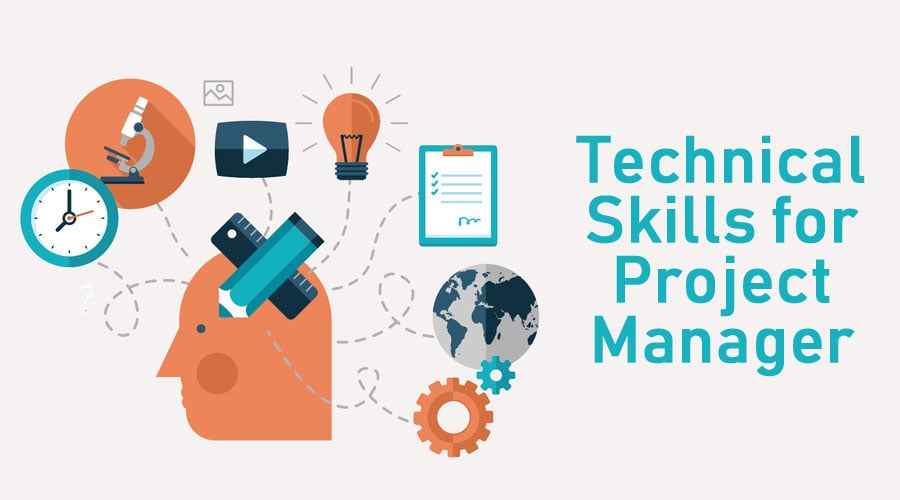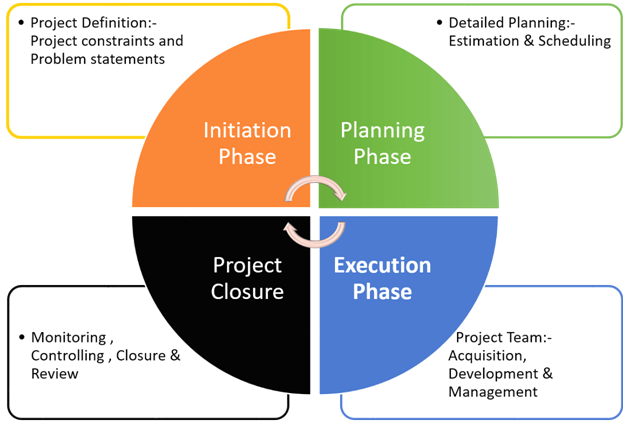Updated June 2, 2023

Importance of Technical Skills for a Project Manager
A project is nothing but the aggregation of the wholesome task. Therefore, it is segregated into various smaller divisions, generally called as modules. Each module has its own functional importance.
Project Lifecycle
- Irrespective of the project size – Small or big, it is essential to understand the project lifecycle. At each stage of the project, we have important milestones – in the beginning, in the middle, and at the end, from starting of the project to the closure.
- There are various phases in any project, and they are together termed as the Project cycle.
- There are four major phases in a standard project:-
1. Initiation
- In the initiation phase, we identify the business need, problem, or opportunity or find out the ways in which team can meet the need, solve the problem or seize the opportunity.
- Feasibility of the project is identified.
- Major Deliverables of the project are figured out.
- Identifying the primary problem to the project and whether the project will deliver a solution to that problem or not.
- Identifying project stakeholders which are figuring out whom the project affects and what their needs may be.
- Identifying deliverables which are defining the product or service to provide.
- Identifying scope which is defining the depth and breadth of the project.
- Developing a business case which is using the above criteria to compare the potential costs and benefits for the project to determine if it moves forward.
2. Planning
- Once the project is approved to move forward based on the problem statement, business case, statement of work we move into the planning phase,
- The larger project is broken into smaller parts.
- Smaller goals are created within the larger project ensuring each is achievable within the given time frame.
- Creating a project plan, workflow documents or process map, estimating budget and creating a financial plan, gathering resources and finding out the risks.
3. Implementation
- Business approval is received, developed a proper project plan and builds the team, now it’s time to work for the project.
- The project manager’s job in this phase of the project management life cycle is the most crucial which is to keep the work on the track, keep the team members bonded, manage timelines, and make sure the work is done as per the original plan.
- Communicating with the team members, monitoring the quality of work, organizing training and managing budget are the important steps in this phase.
4. Closure
- Analyzing project and team performance
- Ensuring all aspects of the project has been completed.
- Take learning and implement it on the next project.
Project Life Cycle
Role of a Good Project Manager in any Project
- It means almost everything to have a good manager in any project.
- A good manager maintains a healthy environment in the team and which in turn make the team members happier hence productive.
- The project is headed as per the decisions of the project manager so it’s important to have a skilled manager.
Below are a few traits of a good manager:-
- Adaptability/Proactivity
- Commitment/Motivation/Drive
- Confidence
- Goal-Orientedness
- Inclusivity/Sociability
- Open-mindedness/Trainability
Project Management
- A good Business means a good owner to it hence it is the prerequisite need to have an owner to a business or a Project whom we called a Project Manager.
- Project Management is the career which is the intersection of technical, business and people skills.
- The world of business is always in the need of more highly skilled project managers having the sound knowledge of all the aspects of that particular project.
- As per the Project Management Institute (PMI), the success rate of a project improves by approximately 40% when the project manager possesses the ideal skill set which is a combination of – a powerful technical skillset, leadership and business management expertise.
Technical skills in Project Manager
- Accountability – Embrace the ownership and accountability of the project happily.
- Active Listening – Actively listens to each stakeholder’s concern and take appropriate action on the same.
- Business Communications – Use the appropriate language and tone when communicating, elaborating or explaining the issues over a phone call, email, chat, presentations, and other forms and any channels of communication.
- Relationship building within the team – Establishing a culture of togetherness where people can work happily and comfortably towards one common goal.
- Decision Making – Decisions at every stage of the project should be purely made on the facts and in the good of the project.
- Leadership – Motivate and inspire the people within the project to meet the deadlines of the deliverables within the project by showing commitment, expertise, confidence, and wish to help everyone solve challenges and achieve goals without any ill intentions.
- Latest technology – Use appropriate framework or technology to arrive at the conclusion.
- Problem Solving/Critical Thinking – Assess issues from different sources and formulate the best solution in addressing specific challenges.
- Research/Information Gathering – Fill knowledge gaps through active research or by directly engaging persons.
Facts and Figures related to Technical skills for Project Manager for the different Projects
- Only 57% of all the projects are completed without additional funding and only 51% of projects meet the original deadline.
- There has been an increasing demand for project management skills in recent years.
- The world of computer ranked the project management skill as the hottest skills for 2017.
- PMI showed a high increase in the demand for project-oriented skills from 2017 through 2027.
- Prices go upwards up when strong demand meets scarce supply.
- As per Glassdoor, in the U.S. at entry-level project managers receive an average salary of $70,249 and Senior project managers earn $102,318 on an average.
- For each year from 2017 to 2027, companies all over the globe will need to fill an annualized figure of 2.2 million new project-oriented roles.
- However, most skillful and ambitious are worth more than $142,000.
Key points for project management job seekers
- Despite the growing number of jobs, there is a lack of candidates because of not having adequate project management skills.
- PMP Certification – To upskill with the latest market trend candidate can go for this certification.
- Get involved in the project with every minute detail.
- Solve business problems.
- Make oneself technically sound.
Recommended Articles
This has been a guide on Technical Skills for the Project Manager. Here we have discussed the project life cycle, role, Facts, technical skills, and key points for project management. You may also look at the following articles to learn more –

